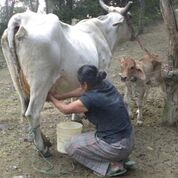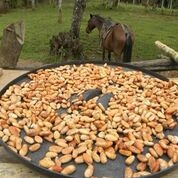The politics of gender and climate change in post-neoliberal Nicaragua
The era of gender-blindness in climate change adaptation policies and interventions is over in post-neoliberal Nicaragua. The National Environmental and Climate Change Strategy describes the Earth that is to be “loved, respected, protected as our own mother” and refers to women as the potential saviors of the planet. While women’s roles were mostly made invisible during the neoliberal era (1990-2007), since the beginning of the new Sandinista regime (2007), women have become the first beneficiaries of social and environmental projects.
In my ethnographic research in rural Nicaragua, I investigate how despite this discursive inclusion of gender and the promotion of the participation of women, Nicaraguan climate change politics contribute to reproducing patriarchy as well as other types of oppressions based on ethnicity, age, class and geographical location. In order to do so, I build on an understanding of climate vulnerability as relational. Such understanding compels me to look at the processes that make rural women and men vulnerable to climate change, rather than assessing levels of vulnerability. Building on the work of feminist political ecologists, my intention is to contribute to re-politicizing climate change by showing how unequal (gendered) power relations mediate both the way the problem is defined and the type of coping solutions that are proposed, as well as adopted. This is crucial: indeed, the perspective of a feminist response to climate change has unfortunately not come closer with the gendering of climate change politics in Nicaragua.
Photo 1: The practice of slash and burn is still widespread in rural areas of Nicaragua. It is often encouraged by large cattle-ranchers in order to install pastures. (Photo by Noémi Gonda, May 2014)
Photo 2: While Nicaraguan environmental policies encourage agro-ecological production, numerous farmers say that they are compelled to use dangerous chemical herbicides because of the high levels of land degradation as well as the lack of support for small-scale agriculture. (Photo by Noémi Gonda, April 2014)
Photo 3: Poor farmers often make arrangements with large cattle-ranchers: they look after the cattle-rancher’s cow against the benefit of the milk and an offspring. This arrangement frequently contributes to destroying the smallholder’s last productive lands (Photo by Noémi Gonda, October 2014).
Photo 4: Conversion of coffee and cattle producers to cocoa production is presented as one of the solutions to adapt to climate change in Nicaragua. However, the development of the cocoa sector faces many challenges: among them, the fact that producing cocoa is seen as a less masculine activity than cattle ranching (Photo by Noémi Gonda, February 2014).
Noémi is a PhD candidate in her 4th year of studies at the Department of Environmental Sciences and Policy at CEU. Previous to starting her PhD, she has worked in Central America for eight years with indigenous groups and farmers' organizations in rural development and natural resources management related issues. Advisor: Guntra Aistara
See also:
GONDA, N. 2014. Género y Adaptación al Cambio Climático [Gender and Climate Change Adaptation]. UNDP, Agronomes et Vétérinaires sans Frontieres. Managua, Nicaragua Downloadable at: http://www.ni.undp.org/content/nicaragua/es/home/library/environment_energy/publication_33/




